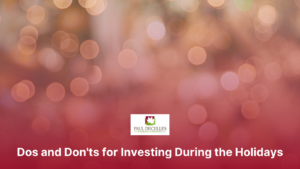Are You Retirement Ready (or Not)?

Whether you are an employee in corporate America or a small business owner, retirement is a part of life. For many, the thought of retiring and whether or not you are ready to take those first steps might be overwhelming or intimidating. Ancient philosopher Lao Tzu once said, “The journey of a thousand miles begins with one step.” [i] Here is a 6 question checklist for small business owners to ask themselves to determine if they are ready for retirement.
☐ Have I decided on a retirement timeline? Most people don’t wake up one day and decide that they will retire tomorrow. It is a decision that requires years of preparation. Knowing when you want to retire is the first step toward pursuing this goal.
☐ Do I have enough money set aside to maintain my quality of life after retirement? This might seem like a no-brainer when it comes to retirement, but many small business owners wonder if they will have enough to comfortably retire. Experts suggest that upon retirement, you want to have at least 10 times your annual salary in savings. Here are a few more questions to consider in preparation for retirement: [ii]
- Are your debts paid off?
- Will you be able to pay your retirement expenses (both entertainment and bills) long-term without having to eventually depend on social security?
- Will the 4 percent rule be an approach that is feasible for you? (The 4 percent rule refers to being able to live off of 4 percent of your invested money in the first year of retirement, then increase or decrease the amount to account for inflation in subsequent years). [iii]
☐ Is my retirement portfolio diversified enough? Selling your business is one way to fund your retirement, but you don’t want it to be the only means that you depend on. Small business owners don’t have the luxury of retirement plans offered to employees of larger companies. You have to take it upon yourself to set up a self-employed 401(k), SIMPLE or SEP IRA, or another forms of retirement savings plan. You can invest in stocks and bonds, CDs, real estate, or some form of alternative investment to help mitigate the risk of one of your investment instruments not performing as expected due to some unforeseen issue or market fluctuation. Consider consulting a financial professional to help you learn what suitable course of action to take to try and lessen the chances making unnecessary mistakes. [iv]
☐ Do I have a post-retirement plan? Having a post-retirement plan can help you find purpose in retirement. There are countless stories out there of people that have saved and invested money for their entire careers so they could retire. They looked forward to the freedom of waking up and doing whatever they want every day; however, a year after retiring, they realize they miss the day-to-day grind of the workforce. Why is that? Simply put, going to work had given them a purpose in their lives.
They were working to provide a comfortable life for their family and saving for retirement. That is why writing out attainable goals, making checklists, and regularly referring to them are important skills to cultivate, especially for retirees. Figure out what your new purpose will be after you retire. Write it down in a notebook and revise these plans periodically. These ideas don’t just entail financial plans and objectives, but lifestyle goals, and hobbies that you may be interested in pursuing but never had time before.
☐ Is my succession plan in order? Establishing a succession plan is not something that is done quickly. It requires planning and analysis, and business owners will often take years preparing to have their business passed on or sold to the right buyer. To start you want to:
- Determine the market value of your business?
- Identify succession candidates.
- Communicate your succession intentions with employees.
- Periodically review and revise your plans as you see fit.
- Stay up-to-date on tax planning and evolving tax laws. [v]
☐ Have I discussed my decisions and options with a financial professional? Creating a retirement plan is complex, and consulting a financial professional can help you design a course of action that works for you and your goals. When it comes to long-term financial goals, time is your greatest commodity, so the sooner you take action, the easier it will be to pursue your objectives.
Important Disclosures:
The opinions voiced in this material are for general information only and are not intended to provide specific advice or recommendations for any individual. To determine which investment(s) may be appropriate for you, consult your financial professional prior to investing.
Investing involves risks including possible loss of principal. No investment strategy or risk management technique can guarantee return or eliminate risk in all market environments.
There is no guarantee that a diversified portfolio will enhance overall returns or outperform a non-diversified portfolio. Diversification does not protect against market risk.
Investing in stock includes numerous specific risks including: the fluctuation of dividend, loss of principal and potential illiquidity of the investment in a falling market.
Bonds are subject to market and interest rate risk if sold prior to maturity. Bond values will decline as interest rates rise and bonds are subject to availability and change in price.
CD’s are FDIC Insured and offer a fixed rate of return if held to maturity.
Investments in real estate may be subject to a higher degree of market risk because of concentration in a specific industry, sector or geographical sector. Other risks can include, but are not limited to, declines in the value of real estate, potential illiquidity, risks related to general and economic conditions, stage of development, and defaults by borrower.
Alternative investments may not be suitable for all investors and involve special risks such as leveraging the investment, potential adverse market forces, regulatory changes and potentially illiquidity. The strategies employed in the management of alternative instruments may accelerate the velocity of potential losses.
This information is not intended to be a substitute for specific individualized tax or legal advice. We suggest that you discuss your specific situation with a qualified tax or legal advisor.
All information is believed to be from reliable sources; however, LPL Financial makes no representation as to its completeness or accuracy.
This article was prepared by LPL Marketing Solutions
Footnotes:
[i] Lao Tzu Quotes – BrainyQuote
[ii] 6 Signs You Have Enough Saved for Retirement, According to CFPs (businessinsider.com)
[iii] What is the 4% Rule and How Can It Help You Save for Retirement? (cnbc.com)
[iv] Retirement Accounts Are Filling up—How Diversified Are They? (usmoneyreserve.com)
[v] Selling a Small Business and Succession Planning for a Small Business (sba.gov)
LPL Tracking # 1-05362322





